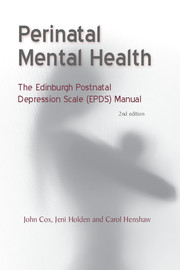Book contents
- Forntmatter
- Contents
- The authors
- Acknowledgments
- Abbreviations
- List of Figures
- Foreword
- Preface to the First Edition
- Preface to the Second Edition
- 1 Postnatal Depression: An Overview
- 2 The Origins and Development of the Edinburgh Postnatal: Depression Scale
- 3 International and Cross-Cultural Issues
- 4 Using the Edinburgh Postnatal Depression Scale in Clinical: Settings: Research Evidence
- 5 Humanistic and Person-Centred Interventions in Perinatal Depression
- 6 Screening and Intervention Services in the Community
- 7 Using the Edinburgh Postnatal Depression Scale
- Appendix 1 The Edinburgh Postnatal Depression Scale
- Appendix 2 Translations of the Edinburgh Postnatal Depression Scale
- References
- Index
Preface to the First Edition
Published online by Cambridge University Press: 05 February 2021
- Forntmatter
- Contents
- The authors
- Acknowledgments
- Abbreviations
- List of Figures
- Foreword
- Preface to the First Edition
- Preface to the Second Edition
- 1 Postnatal Depression: An Overview
- 2 The Origins and Development of the Edinburgh Postnatal: Depression Scale
- 3 International and Cross-Cultural Issues
- 4 Using the Edinburgh Postnatal Depression Scale in Clinical: Settings: Research Evidence
- 5 Humanistic and Person-Centred Interventions in Perinatal Depression
- 6 Screening and Intervention Services in the Community
- 7 Using the Edinburgh Postnatal Depression Scale
- Appendix 1 The Edinburgh Postnatal Depression Scale
- Appendix 2 Translations of the Edinburgh Postnatal Depression Scale
- References
- Index
Summary
The Edinburgh Postnatal Depression Scale (EPDS) is a 10-item self-report scale devised as a screening questionnaire to improve the detection of postnatal depression in the community. This book is written to provide readers in different countries with updated and accessible information on the scale and its use in primary and secondary care. Appendix 1 includes the original scale and a score sheet, and Appendix 2 shows most of the foreignlanguage versions we are aware of.
Depressive disorders are one of the most common causes of disability worldwide. According to the 1999 World Health Report (World Health Organization, 1999), unipolar major depression accounts for 4.2% of the world's total burden of disease as measured by ‘disability adjusted life years’ (DALYS) and is the fifth leading cause of disability.
Postnatal depression, which affects women at a time of maximum vulnerability and can last if untreated for many years, is one of the main contributors to this disconcerting statistic. Yet, as we show in this text, the possibility of secondary prevention through early identification is consistent with the evidence base and is being actively considered by national governments in many countries, led by primary care professionals.
The EPDS was developed in the 1980s because clinical experience in both rich and poor countries showed that unipolar depression, and postnatal depression in particular, is a common disorder that causes much unnecessary misery for women and their families. We were also becoming aware that such depression can adversely affect the development and nutrition of the infant, the continuity of the marriage and the economy of the household.
Since then, worldwide communications have become almost instantaneous, women's health issues have developed a higher profile and the knowledge base of perinatal mental health and perinatal psychiatry has increased substantially. The Marcé Society (an interdisciplinary society that stimulates research and provides a forum for disseminating information about perinatal mental health) has flourished and become more truly international, and the voices of women are now more clearly heard, as qualitative research methods complement a quantitative approach and as voluntary patient and carer groups are influencing governments and so changing mental health priorities.
- Type
- Chapter
- Information
- Perinatal Mental HealthThe EPDS Manual, pp. xiii - xvPublisher: Royal College of PsychiatristsPrint publication year: 2014

